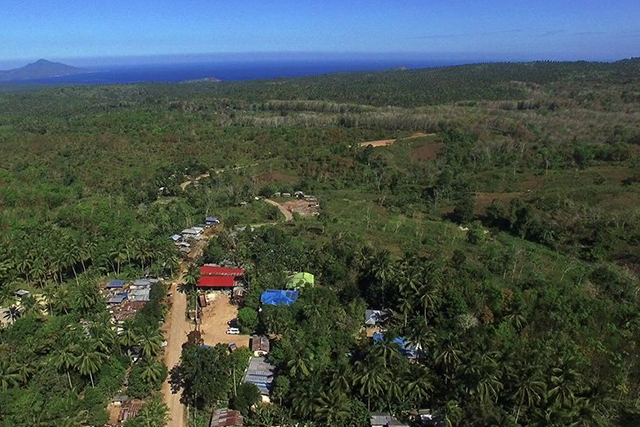
A drone photo of one of the many road projects of the ARMM government in Tipo-Tipo, Basilan. Courtesy of engineer Soler Undug
The Abu Sayyaf in Basilan is now restive with its dwindling control of poor people due to continuing government poverty mitigation efforts since 2012 to hasten the island’s socio-economic growth.
Members of the regional peace and order council (RPOC) in the Autonomous Region in Muslim Mindanao (ARMM) on Wednesday said in Tipo-Tipo town alone, the ARMM administration concreted in recent months four major farm-to-market roads interconnecting hostile territories, where the Abu Sayyaf once had impregnable lairs.
“The Abu Sayyaf is using the issue of poverty to fan anti-government sentiments among local folks from where it gets food and collects money to fund its activities.
Once empowered, people will realize there is no benefit in patronizing the group,” said an official of the ARMM’s Department of Interior and Local Government (DILG), who hails from Basilan.
Military sources said the new roads and the concreting of old ones in Tipo-Tipo by the ARMM government, through the regional public works department and the Basilan District Engineering Office (DEO) are “irritants” for the Abu Sayyaf.
The sources said the continuing compression of Abu Sayyaf bastions, as a positive impact of ARMM’s infrastructure projects in the province, prompted the group to escalate roadside bombings in recent months and the April 9 attack on soldiers moving towards their camp in Barangay Baguindan to hoist the Philippine flag there.
“As if they want to show to the people in the province that they remain a force to reckon with, but the truth is their world is getting smaller each time a road project in the province gets completed. In police parlance we call that `police community relations’ effort,” said Senior Superintendent Oscar Nantes, Basilan’s police director.
Nantes said the law enforcement efforts of the provincial police was, in fact, made easier by the connectivity now of remote barangays to municipal police offices.
A matrix obtained from police and military officials who are also RPOC members indicated that the office of the ARMM’s public works secretary, engineer Don Loong, and the chief of the Basilan DEO, Soler Undug, constructed four major arteries crisscrossing Tipo-Tipo’s isolated farming enclaves in the past three years.
The four projects stated in the document were the Parang Basak-Bohe Baka-Bohe Lebbeng Road, the Tipo-Tipo-Lagayas-Candiis Road and the Albarka-Tipo-Tipo Proper-Limbo Kassah-Magkawa-Kuhon Road, which straddles through agricultural sites in Tipo-Tipo.
The city government of Lamitan, the provincial capital of Basilan, has confirmed there has been a dramatic increase in the procurement of Copra and other farm products by domestic traders from farmers in areas traversed by newly-concreted thoroughfares.
“Even in Lamitan City, the productivity of farmers improved by many folds as a result of the completion of ARMM road projects in its barangays and so the local business climate is improving,” said Vice Mayor Roderick Furigay.
Furigay, who had served as Lamitan City mayor for three consecutive terms prior to his election as vice mayor in 2013, said his constituent-traders are thankful to ARMM Gov. Mujiv Hataman for implementing costly infrastructure projects even in the remotest town in the province.
“We are now `savoring,' like food, the good tastes of these massive socio-economic initiatives of the ARMM and Malacañang. Economic development is the best thesis to address security problems in Basilan and in Lamitan City,” Furigay said.
Evacuees from three barangays in Tipo-Tipo, where soldiers and Abu Sayyaf bandits figured in fierce encounters from April 9 to 14, had told relief workers, dispatched by Hataman’s office to attend to their needs, that Abu Sayyaf forces in the municipality are rabidly opposed to sending children to public schools.
“They want our children to hate non-Muslims and be prepared to fight the government when they grow up,” a farmer’s wife, Sittie Kalima, was quoted by a Cotabato City-based ARMM relief worker as saying during their relief operations in Basilan last week.
Evacuees had said the Abu Sayyaf’s latest rampage in Tipo-Tipo was sparked by increasing restiveness in its ranks owing to the reduction of the areas it controls as a consequence of the ARMM’s infrastructure thrusts.
Besides the new roads built in the area by the ARMM government, the town also boasts now of having a small seaport in Bana-Bana, also built by the Hataman administration through the regional public works department and the office of Undug.
Records from state auditors, supported with drone aerial photos of various ARMM infrastructure projects in Basilan, also revealed that the offices of Loong and Undug, both civil engineers, had constructed a total of 181 kilometers of roads in the island province in the past three years.
Both engineers aim to construct more than 300 kilometers more of new arterial networks in the coming quarters using the ARMM’s yearly infrastructure budget.
Loong said Hataman and President Benigno Aquino III would both have a bilateral legacy of having built in the autonomous region 1,328 kilometers of roads, 103 ports, 101 bridges, 44 drainage structures, 17 shore protection structure, under the regular infrastructure efforts of the DPWH-ARMM from 2012 to 2016.
“No other president and ARMM chief executive have ever initiated such kind of joint socio-economic ventures in the region since its creation 25 years ago,” Loong said.
http://www.philstar.com/nation/2016/04/20/1574903/socio-economic-interventions-weaken-abu-sayyaf-officials-say

No comments:
Post a Comment
Note: Only a member of this blog may post a comment.